Covering Ground
 Understanding seed descriptions
Understanding seed descriptions
They're so small, but not so simple. Seeds seem as though they should be easy to buy, but there is actually a lot to know.
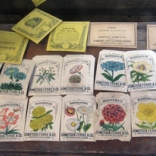 The rich history of Connecticut seed companies
The rich history of Connecticut seed companies
Little did I realize what a deep history Connecticut seed companies had until I began research for "Connecticut’s Long, Rich History of Providing Seed for Growers" for Zip06/The Day. (Download the article at the end of this post.)
For in-depth histories of CT seed companies, visit these links:
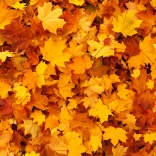 Make the Most of Autumn Leaves
Make the Most of Autumn Leaves
There are two ways of looking at everything, even our famous (or infamous) New England autumn leaf bonanza. Leaf removal is sometimes a big yard job--but it's also a free source of soil fertility. Leaves are important habitat for overwintering insects, reptiles, and amphibians. Leaf piles provide food for overwintering birds.
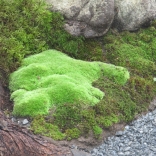 Much to Love About Moss
Much to Love About Moss
For every time I hear the question, "Why is there moss in my lawn?", I would like to turn it around. Why is there lawn growing in the moss? For many spaces, moss is an excellent natural ground cover.
Please download the PDF below.
Also, see Annie Martin's book, "The Magical World of Moss Gardening."
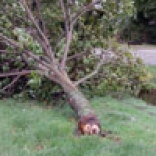 After the Tree Falls: What About Stumps?
After the Tree Falls: What About Stumps?
Got tree stumps, snags,or root sprouts? You can take care of stumps and snags in three basic ways: Decay, repurpose, or remove. Download the article below.
The beautifully carved stump shown here was made by sculptor Kris Connors of Clinton, CT .
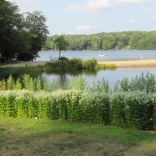 Evolution of a Lakeside Buffer Garden
Evolution of a Lakeside Buffer Garden
Waterside buffer gardens offer lots more than summer blooms (though they surely do offer those!). They help sequester storm water and road runoff, keeping unwanted nitrogen and road pollutants from public water bodies. Through the joint efforts of several organizations, a new buffer garden was installed at Lake Hayward, East Haddam, CT in 2013.
 Where's Your Personal Parkland?
Where's Your Personal Parkland?
Do you have a special place around the yard or garden or neighborhood? Maybe it's your own personal park. It doesn't take a lot to create a personal park. Consider these:
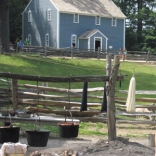 Landscapes of Long Ago on Display at Sturbridge Village
Landscapes of Long Ago on Display at Sturbridge Village
Power lines, street lamps, cars, the sounds of engines--they're not on the village green at Old Sturbridge Village. If the point of OSV is to give a visitor a virtual nanosecond of another, older reality, I got it this sunny Sunday, June 23, as I turned the corner from the admission gate into the main thoroughfare.
 What To Do with Plastic Nursery Pots Now
What To Do with Plastic Nursery Pots Now
Even though all of these plastic nursery pots are labeled recyclable, the black plastic pot on the left is not accepted anywhere in Connecticut's municipal recycling programs. To find out why and what to do with used horticultural containers after the plants are removed, read this recent story in the New London Day/Zip06:
 Close the Door at the Deer Cafe
Close the Door at the Deer Cafe
